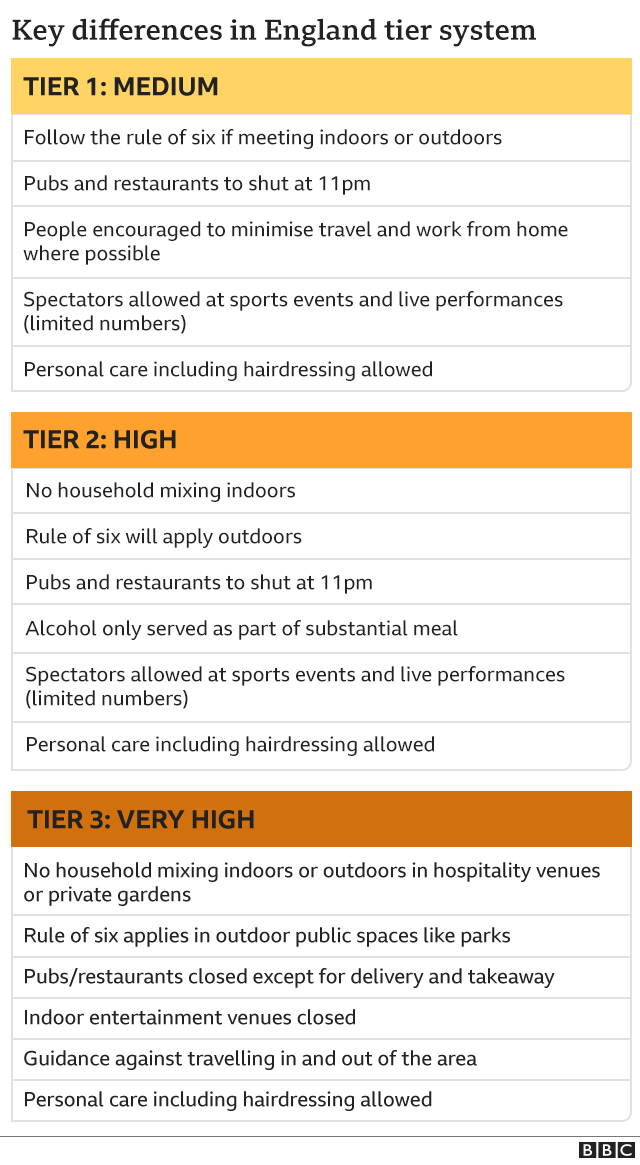Covid tiers: MPs back tougher system for England, despite Tory rebellion
- Published
- comments
Watch the moment it was revealed that MPs approved the new tiered system
A new tougher tier system of coronavirus restrictions for England will begin on Wednesday after the plan was approved by MPs.
The measures, which will come into force at 00:01 GMT, were supported by 291 votes to 78.
The new system will see more than 55 million people in the country placed into the top two strictest tiers.
But 55 Tory MPs voted against the government plan - the largest rebellion of Boris Johnson's premiership.
A further 16 Conservatives abstained, with many of them having expressed concerns about the tougher tiers in the Commons debate that led up to the vote. The 55 Tory rebels included two MPs who acted as tellers.
The new tier system came into force when England's current lockdown ended in the early hours of Wednesday.


Every area of the country is in one of three tiers - medium (one), high (two) and very high (three) - with the vast majority of the population in the higher two tiers.
They are tougher than the previous tier system the country was under, before its second lockdown began in November, the government says.
In tier two, people are not allowed to mix with anyone outside their household or support bubble indoors, although they can socialise in groups of up to six outdoors.
And in tier three, people must also not mix with anyone outside their household or support bubble indoors, or at most outdoor venues.
Conservative Mark Harper, who chairs the lockdown-sceptic Covid Recovery Group of Tory MPs, urged the government to listen to the warnings from its opponents about the "cycle of repeated restrictions".
The health secretary tells MPs his step-grandfather died of Covid-19 in November
He said they "very much regret that in a moment of national crisis so many of us felt forced to vote against the measures that the government was proposing".
But he added that the government "must find a way to... end this devastating cycle of repeated restrictions, and start living in a sustainable way until an effective and safe vaccine is successfully rolled out across the population".
Sir Graham Brady, the chairman of the 1922 Committee of backbench Tory MPs, voted against the plans, saying: "If government is to take away fundamental liberties of the people whom we represent, they must demonstrate beyond question that they're acting in a way that is both proportionate and absolutely necessary.
"Today, I believe the government has failed to make that compelling case."
And former cabinet minister, Damian Green, whose Kent constituency is in the highest tier, also said the plans lacked public support, adding: "I've had the most angry emails over a weekend since the Dominic Cummings trip to Barnard Castle."
But Foreign Secretary Dominic Raab said the new tiered system would help "avoid another lockdown", and "help the UK bridge into the spring, where we hope a vaccine will move us into a whole different place".


It's not even a year since Boris Johnson was carried to a thumping victory on the back of months of agonising parliamentary fiasco over Brexit.
And it should, theoretically, have given Boris Johnson the kind of comfortable cushion in the Commons that no prime minister had had since the days of Tony Blair.
That has hardly gone according to plan.
Despite the prime minister making appeals in person to MPs tonight, although Downing Street had moved over the last few days to meet some of their unhappy MPs demands by publishing documents, and promising more votes in the near future, 55 Tory MPs banded together to give the Boris Johnson his biggest Parliamentary kicking yet.
With more abstaining, the message from the backbenches to the government's front row was clear - right now, Downing Street should not feel able to rely completely on their support.
Remember, the vote did actually pass. But this is a notable political moment too.

Labour MPs were ordered to abstain in the vote, with party leader Sir Keir Starmer saying he recognised restrictions needed to continue, but he was "far from convinced" the new system would work.
He also said help for businesses moving into the toughest tiers was "nowhere near sufficient".
But 15 Labour MPs defied Sir Keir to vote against the changes.
The tiers will be reviewed every two weeks and Mr Johnson has promised MPs a vote on whether to keep the system before 2 February.

Opening the debate in the Commons on Tuesday, Mr Johnson urged MPs to support his proposals - offering an additional £40m for some pubs in tiers two and three.
He also said he appreciated the "feeling of injustice" many felt at their tier allocation, and pledged to "look in granular detail" at the "human geography" of the virus when the tiers are reviewed.
Closing the debate for the government, an emotional Matt Hancock described how he had been personally affected by the virus, after his step-grandfather died from Covid-19.
"We can afford to let up a little, we just can't afford to let up a lot," he told MPs.
"Let that be the message that goes out from this House. We know through repeat experience what happens if this virus gets out of control."
Laura Foster explains the new three tier system for England
Despite the appeals, the government faced its largest rebellion of Mr Johnson's tenure.
The last time the number got close was when 44 Tory MPs voted against the government's 10pm curfew for pubs, although it was still approved by the Commons.
A government spokesman said they welcomed the result of the vote, which will "help to safeguard the gains made during the past month and keep the virus under control".
But they also said the government would "continue to work with MPs who have expressed concerns in recent days".